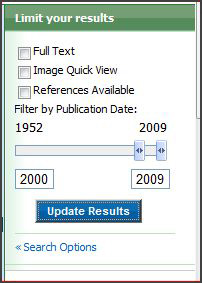October 15, 2009
Basic Tracking Skills: How to find what you're hunting for
By: Andrea D. Lythgoe, LCCE | 0 Comments
This is the third article in our Understanding Research series.
So you are at your index of choice. What now? You will need to use key words to search. The best way to learn to use key words effectively is to do a lot of practice searching. Some tips to help you get the most out of your practice:
1. Make sure you spell the words correctly. Seems almost silly that I would have to say it, but it is one of the most common mistakes.
2. Use quotation marks around phrases you want to search together. This can be a two-edged sword, though, as a search for 'active management of labor' might miss a study that uses the phrasing 'an active approach to labor management.'
3. Make use of the terms 'and' 'or' and 'not'. If you wanted studies on smoking in pregnancy, you'd search for smoking AND pregnancy. The 'or' command would be useful if you have similar terms you want to search at once, like hypertension OR high blood pressure. The 'not' command can be used to eliminate unrelated results. For example labor NOT workforce. In some databases, you may need to capitalize these operators.
4. Don't be too broad. If you're looking for something on the risks of induction before 40 weeks, don't just search 'induction' because you'll get a lot of results ' and some won't even have to do with labor! If you do find you get too many results, look for an option to refine your search to narrow the results to a manageable number. Often you'll see a set of checkboxes where you can limit the results to a certain date range, only those with full text, or other criteria. Here is an example of the results limiting box found within EBSCO.

I've used the slider to show that I only want results published since the year 2000. When I click 'update results' I'll have refined my search so I have fewer results to look through.
5. Don't be too specific. A search for induction risks labor 40 weeks gestation might eliminate a study titled 'Timing of Elective Labor Induction at Term'.
6. If your first term doesn't yield good results, try a different word that means the same thing. If birth location isn't getting results, try place of birth. Or just start off using both terms with the 'or' in between.
'birth location' OR 'place of birth'
Also consider alternate spellings, like labor/labour or breastfeeding/breast feeding to see what comes up under each of those.
7. Finding little on Cytotec? Try searching 'misoprostol' the generic name for the drug. Most published research will use the generic names for drugs since brand names can vary from country to country.
8. Use the medical lingo. I once got a call from a student who was frustrated beyond measure that she couldn't find a single study to support her client in refusing a c-section for a baby that was estimated to weigh 9 pounds. 'There's GOT to be something!' Come to find out, she was searching for 'big babies' and 'c-section'. A search for macrosomia risks did turn up some helpful results.
9. Some (but not all) indexes will allow you to use the asterisk * symbol to truncate (or shorten) your search term. So if you want to do a search for something on episiotomy, you can search for 'episiotom*' and the index will pull up anything with episiotomy, episiotomies, episiotomological, or any other word that starts with 'episiotom-'. (OK, I admit, I made up the word 'episiotomological'!) Be careful you don't go too vague on this. A search for 'epi*' will pull up episiotomy, epidural, epigastric, epistemology, epi-everything!
The best way to learn how to search is to practice, practice, practice. I find that it helps me to keep a running log of the terms I have tried to avoid repeating searches and to see things I may have missed. If you're not finding what you want after several tries in one index, try another. If you are in a library building while you search, find a librarian and ask for help. Librarians can be great sources for the tips and tricks of searching!
Next week: Advanced Tracking Tools: MeSH Keywords
Tags
Maternal Infant Care Help and Training Andrea Lythgoe Understanding Research Tracking Down Studies